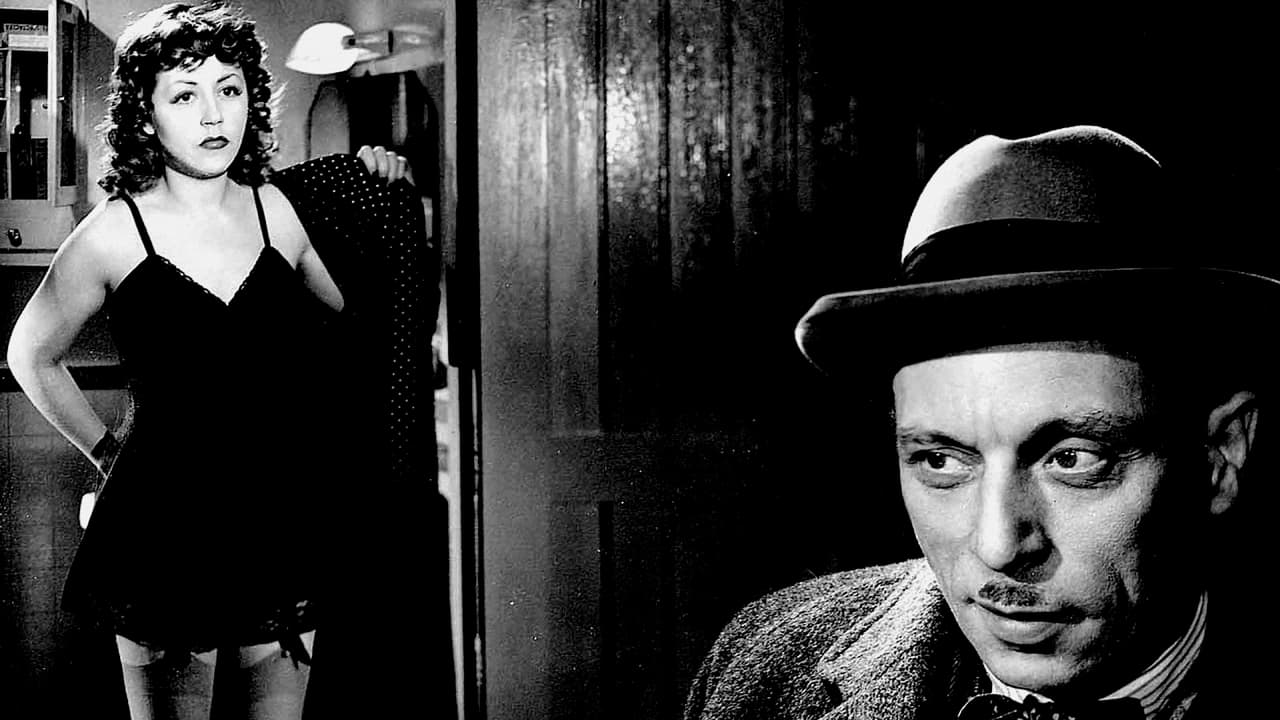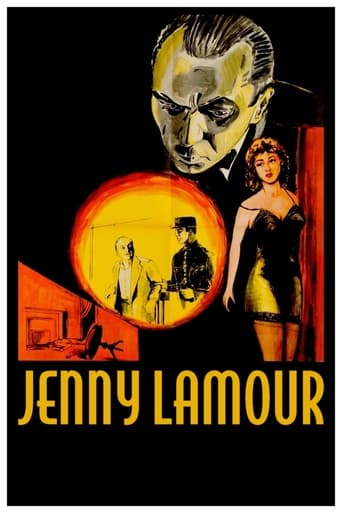

You won't be disappointed!
... View MoreMost undeservingly overhyped movie of all time??
... View MoreAfter playing with our expectations, this turns out to be a very different sort of film.
... View MoreThe film's masterful storytelling did its job. The message was clear. No need to overdo.
... View MoreAs I have said in my review of his film LES ESPIONS (THE SPIES, 1957), Henri-Georges Clouzot was the French Hitchcock, and every bit as brilliant in his way, but with more humour and human compassion. This classic film by Clouzot has so many Hitchcockian touches of suspense and irony that it shows the similarity of the two men probably more than any other Clouzot film. See also my review of another of his masterpieces, LE CORBEAU (THE CROW, 1943). Clouzot is best known today for his film THE WAGES OF FEAR (LE SALAIRE DE LA PEUR, 1953, see my review), but I consider that an inferior work of his, unworthy of his talent. Sometimes he got a bit too carried away by 'the dark side'. We must also not forget his astonishing documentary portrait of Picasso, LE MYSTÈRE PICASSO (1956), which is possibly the most incredible film about a living painter ever made. The title of this film refers to the Paris Police Headquarters at 36 Quai des Orfèvres ('Quay of the Goldsmiths', because in the Middle Ages goldsmiths really did have their shops there), but the police do not even enter the story until more than half an hour has passed, as this is not really a detective film at all. The plot is so intricate and complex that it has less to do with whodunit than it has with Clouzot's main preoccupation in life, the deeper reaches of human psychology. The cast is universally excellent. Even tiny roles such as Joelle Bernard as Ginette (who sings beautifully, sitting in a chair with a fag in her mouth and a totally blank expression), Jeanne Fusier-Gir (1885-1973, veteran of 162 titles) as Pacquerette the coat lady at the Eden Theatre, and that of the old taxi driver Lafour played by Pierre Lauquey (1884-1962, veteran of an astounding 225 titles and one of France's most beloved character actors) are executed with perfection. Louis Jouvet, with his sad expression of a retired hound, lends a human face and a haunting and melancholy air to the inspector handling the murder case, the only love of his life being his sweet little boy who is 'the only thing I brought back from the Indies'. A great deal of this film was shot on location in Paris. One scene takes place at the famous restaurant Lapérouse at 51 Quai des Grands Augustins, the street where Picasso's studio still was at that date, I believe, and where Anatole France lived until his death. It is shocking to see the Postwar desolation of the Quai at that time (1946). The shop next door to the restaurant is vacant and for sale, and a few doors down one shop has its door blocked up with breeze blocks as if it had just been sealed by the Gestapo. Everywhere is hopelessly dingy and depressing, both outside and in. It is as if the German Army had left only minutes before. Clearly, Paris was not yet back on its feet by any means. In the film, everyone is wrapped up in overcoats indoors because of the lack of heating everywhere, and there is mention of having run out of coal for a small coal stove. People are seen wiping their armpits because of sweating too heavily under all their woollen jumpers. The star of the film is the overwhelmingly extrovert and cheeky Suzy Delair, who was Clouzot's live-in girlfriend. Words fail me; you have to see her to believe her in the role of Jenny Lamour. Her friend, the striking and brooding blonde Dora, played by Simone Renant, is secretly in love with her with 'a love that can never speak its name'. Jenny's husband Maurice is played by popular French actor Bernard Blier (a Gallic taste, less appealing to us perhaps, but then French men never come up to the standard of all those amazing French women, do they? And what do the French women see in them?). Much of the cinematic brilliance of this film is found in its moments of intense suspense. At one point, a murder address scribbled on a scrap of newspaper is picked up during an interview by the inspector and used to light his pipe. The pipe goes out and he uses it a second time. Meanwhile, the two people being interviewed are both in agonies of anxiety that he will glance at the paper and see the evidence. But he does not. Toscano's Gypsy Orchestra features in the film, and it plays the Gypsy tune 'Doina' extremely loud while the inspector is carrying out a particularly intense crime interview in the same room. This heightens the tension to an incredible degree. And there is one other occasion when Clouzot uses loud background noise to intensify suspense in the foreground. This may well be derived from Orson Welles's use of 'sound as confusion' techniques. The murder mystery in the film is a bizarre web of coincidences (such as an unexpected car theft taking place so that one of the suspects who has thus lost his mode of transport has to run frantically for 45 minutes to complete his alibi) and misunderstandings, but the film is really about the psychologies of the people involved in all of these complications. Clouzot wishes to explore why people do stupid things, how incompetent they really are, how vain many of their motives are, and how unexpected the ensuing events can become. None of the main protagonists in this film is really a bad person, but most of them are fools. The least demonstrative and most repressed character in the story, the secret lesbian, is the only one who is willing to make a sacrifice for another person or behave sensibly. The lonely and mournful inspector says to her late in the film: 'I have developed a sympathy for you. You and I have something in common. Neither of us has any chance of ever getting a woman.'
... View MoreThis is an exceptional picture with so much to recommend it. The acting and writing are terrific and there are lots of great twists and turns in the plot. As a French "Noir" film, its language is certainly a lot earthier than its American counterparts, but to me this just added to the realism. Additionally, I liked how non-glamorous everyone was--particularly the husband and the lieutenant. About the only negative, and the reason the film gets a 9 and not a 10, is because there was a glaring plot hole. Like another famous French film, Drôle de Drame, the confusion between the cops and the accused could easily have been settled in the beginning, but the characters made rather stupid decisions. For this, you just need to suspend disbelief and keep watching--the payoff is well worth the wait.This is simply one of the finest French films I have seen. Period.
... View MoreShould we take the opening shot as a strange frame??? I guess we have to. Anyway two women are behind a closing umbrella, they walk upstairs to the talent agency and we go with them...and then they are never to be seen again. Okay, how come not INSIDE the place, at the piano, or even outside with the SOUND of the piano, then track inside and over, a la Hitchcock??? So I guess Clouzot is already telling us in a not very subliminal manner that we are following a segment of postwar society: especially how he then uses a Citizen Kane=like song cut up into about five pieces to show the lady singing traveling from the talent agency all the way to her first roses and applause of her Vaudeville debut.After that we are relentless observers of more or less small disgusting details of a defeated country getting off its war torn tattered knees. And nobody ever handled small disgust better than Clouzot. In fact, too bad he never tried Sartre's Nausea. Almost everything we see after the first few minutes makes us ever so slightly queasy. ....okay, okay I'm grossly overstating that, let's just settle for a general feel of a lot of the film. Look carefully, in fact, and you will even see one of the cops picking his nose. And in how many films has anyone ever done that. Then there is a very loud nose blowing bit in front of the photographer lesbian by the main cop, and notice that she does not, literally, blink an eye or raise an eyebrow.The point of all this is an almost feverish immersion in contiguity, seemingly, until you can smell practically every scene as well as see and feel it. As for the other aspects of the movie, others here have covered them in a lot more detail than I. But forget about the mystery here: this is the ultimate McGuffin. Clouzot is about as interested in the real killer as those two women coming in out of the rain in the first few seconds of the film and are never seen again. From beginning to end all he wanted to do was follow a bunch of people around, not even particularly interesting ones at that, and say, here look at this woman's twitch, that man's hitching of his pants in all their insignificance, years and years before Tina Turner was singing we don't need another hero. \Even the forced levity of the ending is bleakly done in a dilapidated part of Paris, and rather chilly bare walled apartment. With only the couples love for each other to see them through, as if to say there must be two or three million like you throughout the city, working your fingers off by the day for a little love at night.From this it was just a short step to Wages of Fear and the ultimate in despair. They don't even know how to make films like this anymore in the U.S. For that matter, they didn't even know how to very much in France then, much less now. The relentless detail of gesture makes even the neorealists of Italy look like bad psychologists. Which I guess makes Clouzot a kind of Rosselini on speed. Very enjoyable nonsense, this movie. The only flaw, seems to me, and as was pointed out by another viewer, the lead woman is somehow not quite right. Everybody else in the film is just about perfectly cast.
... View MoreWhat do you get when you have a tenacious, seasoned French police inspector by the name of Maurice Martineau is called to solve a murder case? Well, simply a very entertaining, fun film. The re-mastered black-and-white film "Quai des Orfevres" delivers the goods despite romance, jealousy and marriage that seem to just get in the way towards the truth of 'who done it?'Inch by inch, technique by technique as seasoned by experience and intuition, the patience of this master Inspector etches into the truth -- but of course, with the help of a bag full of dirty police interrogation tricks.Martineau is the centerpiece of this film. The use by director Henri-Georges Clouzot of raucous background music to intensify the drama in grand film noir style is a wonderful wrapper around the visual experience.Martineau eventually solves the mystery and arrests the culprit. Hey, he is good!! But alas, Martineau, too, can keep a dark secret in his past. Who is that boy that is perhaps not his son?Some things can never get solved -- even beyond the closing credits.
... View More